Family planning in Global South hit by UK aid cuts, research finds

The use of contraception is soaring around the world, but international funding to meet demand for family planning in the developing world has been hit by sharp UK aid cuts, research has found.
A survey of more than 80 nations found more women were using contraception than ever before and contraceptive users had doubled in many nations over the past decade.
Growth was sharpest in sub-Saharan Africa, according to the research by the FP2030 family planning alliance.
Around 371 million women of reproductive age in low and lower-middle-income countries are now using a modern method of family planning, up by 87 million from a decade ago.
Dr Samukeliso Dube, executive director of FP2030, said the report showed there was an “unstoppable” demand for modern contraception.
She said: “Women want to control whether and when to have children, and how many children to have.
“The past 10 years have been full of obstacles for country health systems – wars, political upheavals, natural disasters, deadly disease outbreaks, and lately the Covid-19 pandemic.
“Yet through it all, women everywhere have continued to seek out and use modern contraception in ever-growing numbers.”
‘A missed opportunity for millions of women’
Modern contraception methods include everything from condoms and the pill, to intrauterine devices, sterilisation and implants.
Contraception not only improves women's health, education and prosperity, but also slows population growth.
The world population is estimated to have topped 8 billion people in November 2022 and is more than three times larger than it was in the middle of the last century.
Growth rates are slowing, but the world's population is expected to increase by nearly 2 billion persons in the next 30 years and could peak at nearly 10.4 billion in the mid-2080s.
Dr Dube said: “We cannot talk about meeting any of the goals the world has set out to achieve without talking about family planning.
“It is part and part of the solution to so many of the challenges that we see in the world today.”
The body's 2022 measurement report looked in detail at 15 African countries: Benin, Burkina Faso, Ethiopia, Guinea, Madagascar, Mali, Mauritania, Mozambique, Niger, Nigeria, Rwanda, Senegal, Tanzania, Togo, and Uganda.
The survey found that despite the growing use of contraception, not all women who needed it could get it.
In most of the 15 countries reviewed, more than one-in-five sexually active young women (aged 15-24) have an unmet need for contraception.
“This report shows us that despite progress in recent years, there is still much work to be done when it comes to meeting the needs of women of reproductive age in sub-Saharan Africa,” said Jason Bremner, senior director of data and measurement.
“If this rising demand is not met by high quality services, consistent contraceptive supplies, and supportive policies and financing, it will be a missed opportunity for millions of women – and for our collective futures.”
Yet the body warned that donor funding was not keeping up with demand. Money dipped after 2019 and had been broadly level since then, largely due to UK aid cuts.
“This flat funding and decline from the peak in 2019 of 1.5 billion is largely due to a decrease of a few hundred million from the UK Government,” he said.
Dr Dube said: “Failing to adequately fund family planning efforts would be a missed opportunity for millions of women.
“We need not only to hold the line, but also to secure new funding to accommodate the surge in demand for family planning. The hard-won gains of the last 10 years could slip away if we don’t act now.”
Protect yourself and your family by learning more about Global Health Security

 Yahoo News
Yahoo News 
